The Rise of 5G Technology: Transforming Connectivity

The introduction of 5G technology is ushering in a new era of connectivity, promising to revolutionize the way we interact with technology and the world around us. With speeds that far exceed those of its predecessor, 4G, and the ability to connect more devices simultaneously, 5G is poised to transform industries, enable new technologies, and enhance user experiences. From smart cities to healthcare and entertainment, the impact of 5G technology will be felt across the globe.
1. Faster Speeds and Reduced Latency
One of the most significant advantages of 5G is its speed. 5G networks can achieve download speeds of up to 10 Gbps, compared to 4G’s maximum of 1 Gbps. This means faster streaming, quicker downloads, and smoother video conferencing, all of which enhance the user experience. But 5G isn’t just about speed; it also offers dramatically reduced latency. Latency refers to the delay before data begins to transfer after an instruction is given. For 4G, this delay is typically around 50 milliseconds, but with 5G, it drops to as low as 1 millisecond. This near-instantaneous response is crucial for applications like autonomous vehicles and remote surgeries, where every second counts.
2. Supporting the Internet of Things (IoT)
5G technology is designed to support a massive increase in connected devices, making it a driving force behind the growth of the Internet of Things (IoT). IoT refers to the network of physical devices—such as smart home appliances, wearable tech, and industrial machines—that are connected to the internet and can communicate with each other. With 5G, billions of devices can be connected simultaneously without a drop in performance. This will pave the way for innovations like fully autonomous factories, smart grids for energy efficiency, and enhanced smart home systems.
3. Transforming Industries
Beyond improving everyday user experiences, 5G has the potential to transform entire industries. In healthcare, for instance, 5G’s high-speed, low-latency capabilities enable real-time telemedicine and remote surgery. In the entertainment industry, 5G allows for more immersive experiences in virtual reality (VR) and augmented reality (AR). Manufacturing industries will benefit from more efficient and automated operations thanks to connected machinery and robotics.
4. Building Smart Cities
Another key area where 5G will have a significant impact is the development of smart cities. With 5G, cities can leverage IoT devices to manage traffic flow, reduce energy consumption, and improve public safety. For example, smart traffic systems can communicate with vehicles in real-time to optimize traffic lights and reduce congestion, while smart grids can monitor and adjust energy distribution based on demand, leading to more sustainable urban living.
As 5G technology continues to expand globally, it is clear that its capabilities will not only enhance personal connectivity but will also drive innovation across numerous sectors, transforming how we live and work.